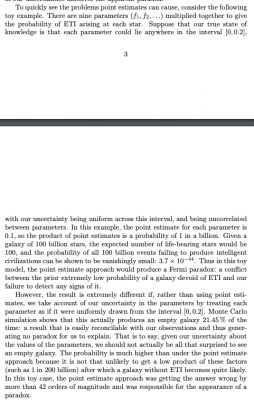ralfy
Devoted Cultist
- Joined
- Jun 29, 2013
- Messages
- 170
That reminds me of this article, especially the ff. paragraph:
From "E.T. and God"
Some scientists believe that life on Earth is a freak accident of chemistry, and as such must be unique. Because even the simplest known microbe is breathtakingly complex, they argue, the chances that one formed by blind molecular shuffling are infinitesimal; the probability that the process would occur twice, in separate locations, is virtually negligible. The French biochemist and Nobel laureate Jacques Monod was a firm believer in this view. "Man at last knows he is alone in the unfeeling immensity of the universe, out of which he has emerged only by chance," he wrote in 1971. He used this bleak assessment as a springboard to argue for atheism and the absurdity and pointlessness of existence. As Monod saw it, we are merely chemical extras in a majestic but impersonal cosmic drama—an irrelevant, unintended sideshow.
From "E.T. and God"


